Compassion Fatigue among Mental Health Nurses: Prevention and Mitigation Strategies
VerifiedAdded on 2023/06/15
|14
|3989
|455
AI Summary
This paper discusses the prevalence, causes, and effects of compassion fatigue (CF) among mental health nurses caring for dementia patients. It also suggests evidence-based strategies for prevention and mitigation of CF to ensure quality care delivery and reduce nursing burnout and turnover.
Contribute Materials
Your contribution can guide someone’s learning journey. Share your
documents today.
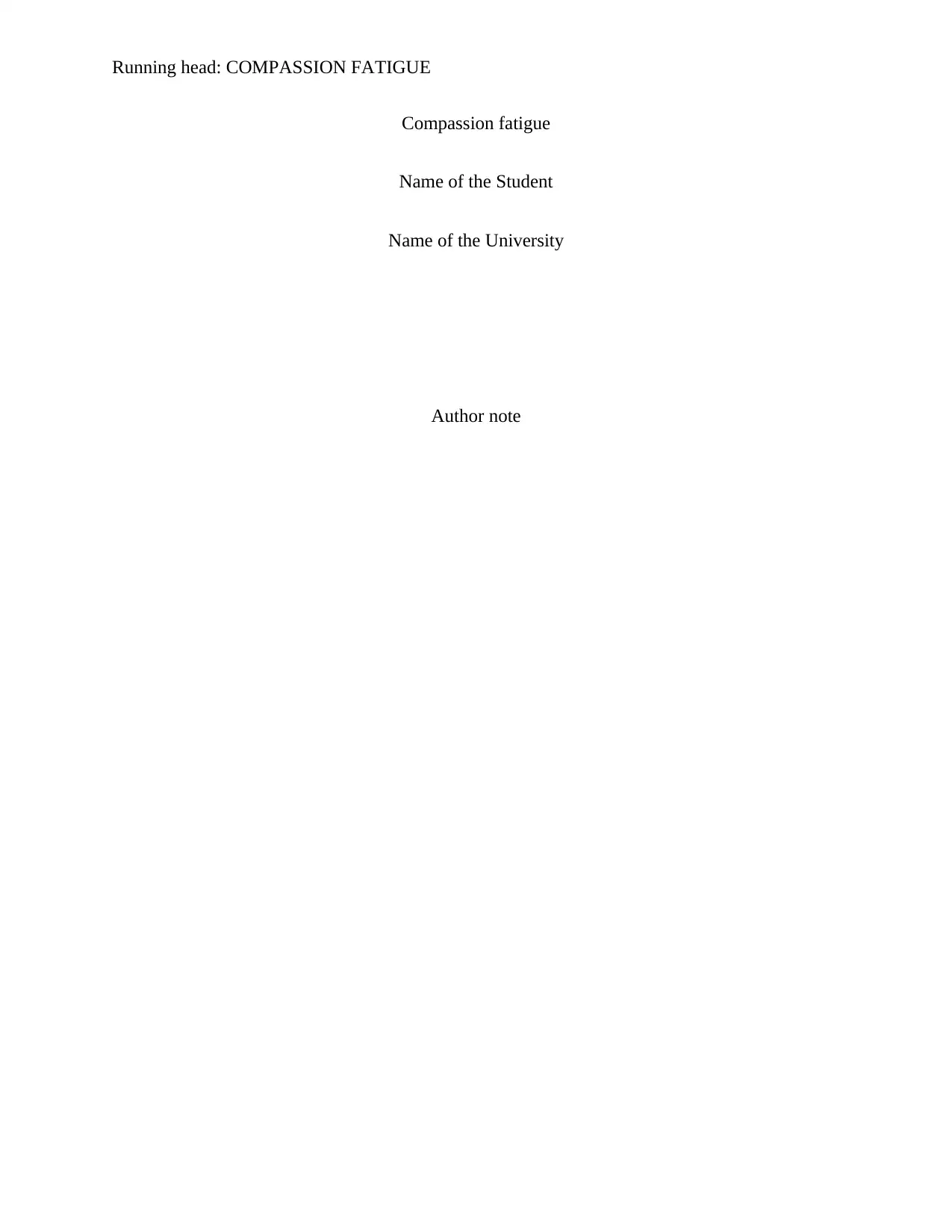
Running head: COMPASSION FATIGUE
Compassion fatigue
Name of the Student
Name of the University
Author note
Compassion fatigue
Name of the Student
Name of the University
Author note
Secure Best Marks with AI Grader
Need help grading? Try our AI Grader for instant feedback on your assignments.
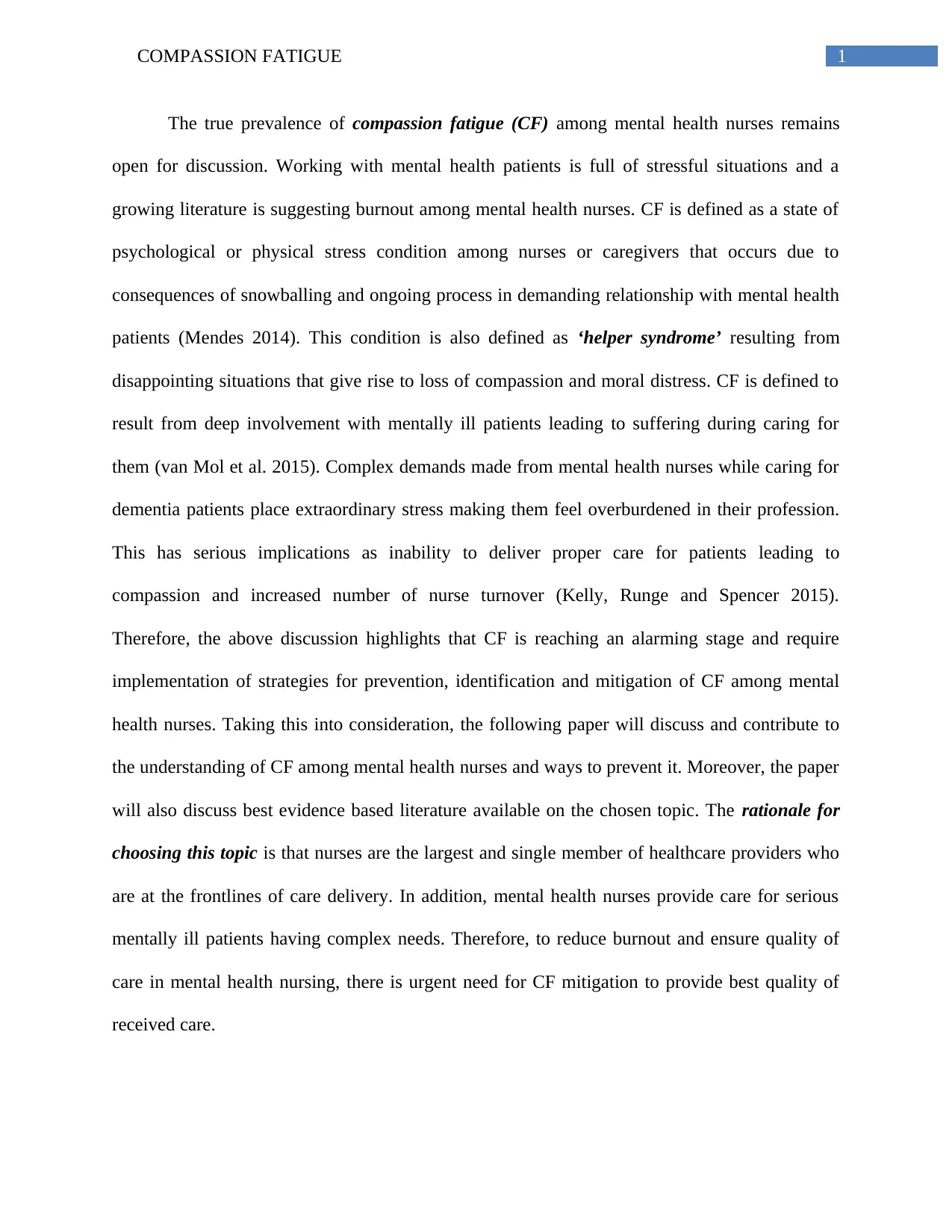
1COMPASSION FATIGUE
The true prevalence of compassion fatigue (CF) among mental health nurses remains
open for discussion. Working with mental health patients is full of stressful situations and a
growing literature is suggesting burnout among mental health nurses. CF is defined as a state of
psychological or physical stress condition among nurses or caregivers that occurs due to
consequences of snowballing and ongoing process in demanding relationship with mental health
patients (Mendes 2014). This condition is also defined as ‘helper syndrome’ resulting from
disappointing situations that give rise to loss of compassion and moral distress. CF is defined to
result from deep involvement with mentally ill patients leading to suffering during caring for
them (van Mol et al. 2015). Complex demands made from mental health nurses while caring for
dementia patients place extraordinary stress making them feel overburdened in their profession.
This has serious implications as inability to deliver proper care for patients leading to
compassion and increased number of nurse turnover (Kelly, Runge and Spencer 2015).
Therefore, the above discussion highlights that CF is reaching an alarming stage and require
implementation of strategies for prevention, identification and mitigation of CF among mental
health nurses. Taking this into consideration, the following paper will discuss and contribute to
the understanding of CF among mental health nurses and ways to prevent it. Moreover, the paper
will also discuss best evidence based literature available on the chosen topic. The rationale for
choosing this topic is that nurses are the largest and single member of healthcare providers who
are at the frontlines of care delivery. In addition, mental health nurses provide care for serious
mentally ill patients having complex needs. Therefore, to reduce burnout and ensure quality of
care in mental health nursing, there is urgent need for CF mitigation to provide best quality of
received care.
The true prevalence of compassion fatigue (CF) among mental health nurses remains
open for discussion. Working with mental health patients is full of stressful situations and a
growing literature is suggesting burnout among mental health nurses. CF is defined as a state of
psychological or physical stress condition among nurses or caregivers that occurs due to
consequences of snowballing and ongoing process in demanding relationship with mental health
patients (Mendes 2014). This condition is also defined as ‘helper syndrome’ resulting from
disappointing situations that give rise to loss of compassion and moral distress. CF is defined to
result from deep involvement with mentally ill patients leading to suffering during caring for
them (van Mol et al. 2015). Complex demands made from mental health nurses while caring for
dementia patients place extraordinary stress making them feel overburdened in their profession.
This has serious implications as inability to deliver proper care for patients leading to
compassion and increased number of nurse turnover (Kelly, Runge and Spencer 2015).
Therefore, the above discussion highlights that CF is reaching an alarming stage and require
implementation of strategies for prevention, identification and mitigation of CF among mental
health nurses. Taking this into consideration, the following paper will discuss and contribute to
the understanding of CF among mental health nurses and ways to prevent it. Moreover, the paper
will also discuss best evidence based literature available on the chosen topic. The rationale for
choosing this topic is that nurses are the largest and single member of healthcare providers who
are at the frontlines of care delivery. In addition, mental health nurses provide care for serious
mentally ill patients having complex needs. Therefore, to reduce burnout and ensure quality of
care in mental health nursing, there is urgent need for CF mitigation to provide best quality of
received care.
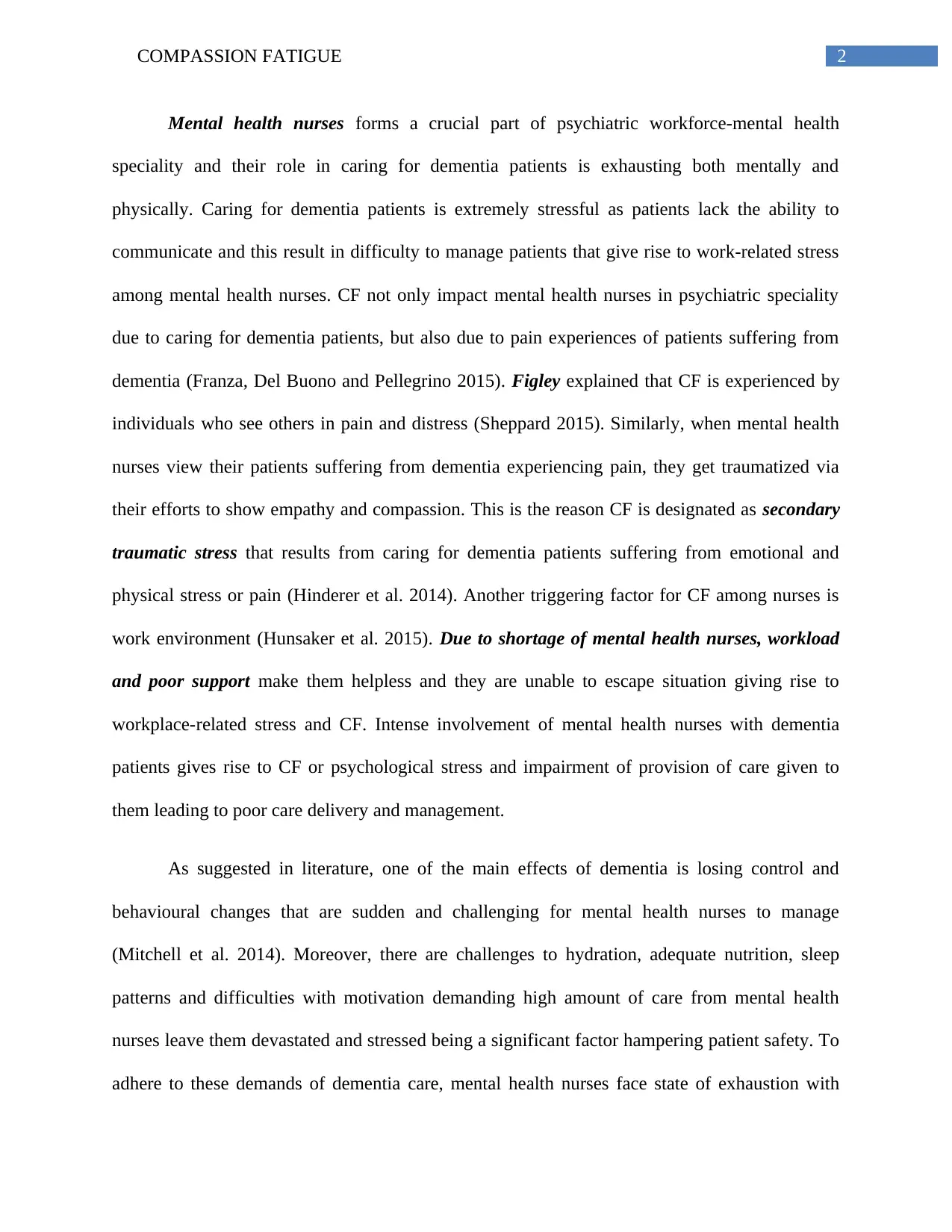
2COMPASSION FATIGUE
Mental health nurses forms a crucial part of psychiatric workforce-mental health
speciality and their role in caring for dementia patients is exhausting both mentally and
physically. Caring for dementia patients is extremely stressful as patients lack the ability to
communicate and this result in difficulty to manage patients that give rise to work-related stress
among mental health nurses. CF not only impact mental health nurses in psychiatric speciality
due to caring for dementia patients, but also due to pain experiences of patients suffering from
dementia (Franza, Del Buono and Pellegrino 2015). Figley explained that CF is experienced by
individuals who see others in pain and distress (Sheppard 2015). Similarly, when mental health
nurses view their patients suffering from dementia experiencing pain, they get traumatized via
their efforts to show empathy and compassion. This is the reason CF is designated as secondary
traumatic stress that results from caring for dementia patients suffering from emotional and
physical stress or pain (Hinderer et al. 2014). Another triggering factor for CF among nurses is
work environment (Hunsaker et al. 2015). Due to shortage of mental health nurses, workload
and poor support make them helpless and they are unable to escape situation giving rise to
workplace-related stress and CF. Intense involvement of mental health nurses with dementia
patients gives rise to CF or psychological stress and impairment of provision of care given to
them leading to poor care delivery and management.
As suggested in literature, one of the main effects of dementia is losing control and
behavioural changes that are sudden and challenging for mental health nurses to manage
(Mitchell et al. 2014). Moreover, there are challenges to hydration, adequate nutrition, sleep
patterns and difficulties with motivation demanding high amount of care from mental health
nurses leave them devastated and stressed being a significant factor hampering patient safety. To
adhere to these demands of dementia care, mental health nurses face state of exhaustion with
Mental health nurses forms a crucial part of psychiatric workforce-mental health
speciality and their role in caring for dementia patients is exhausting both mentally and
physically. Caring for dementia patients is extremely stressful as patients lack the ability to
communicate and this result in difficulty to manage patients that give rise to work-related stress
among mental health nurses. CF not only impact mental health nurses in psychiatric speciality
due to caring for dementia patients, but also due to pain experiences of patients suffering from
dementia (Franza, Del Buono and Pellegrino 2015). Figley explained that CF is experienced by
individuals who see others in pain and distress (Sheppard 2015). Similarly, when mental health
nurses view their patients suffering from dementia experiencing pain, they get traumatized via
their efforts to show empathy and compassion. This is the reason CF is designated as secondary
traumatic stress that results from caring for dementia patients suffering from emotional and
physical stress or pain (Hinderer et al. 2014). Another triggering factor for CF among nurses is
work environment (Hunsaker et al. 2015). Due to shortage of mental health nurses, workload
and poor support make them helpless and they are unable to escape situation giving rise to
workplace-related stress and CF. Intense involvement of mental health nurses with dementia
patients gives rise to CF or psychological stress and impairment of provision of care given to
them leading to poor care delivery and management.
As suggested in literature, one of the main effects of dementia is losing control and
behavioural changes that are sudden and challenging for mental health nurses to manage
(Mitchell et al. 2014). Moreover, there are challenges to hydration, adequate nutrition, sleep
patterns and difficulties with motivation demanding high amount of care from mental health
nurses leave them devastated and stressed being a significant factor hampering patient safety. To
adhere to these demands of dementia care, mental health nurses face state of exhaustion with
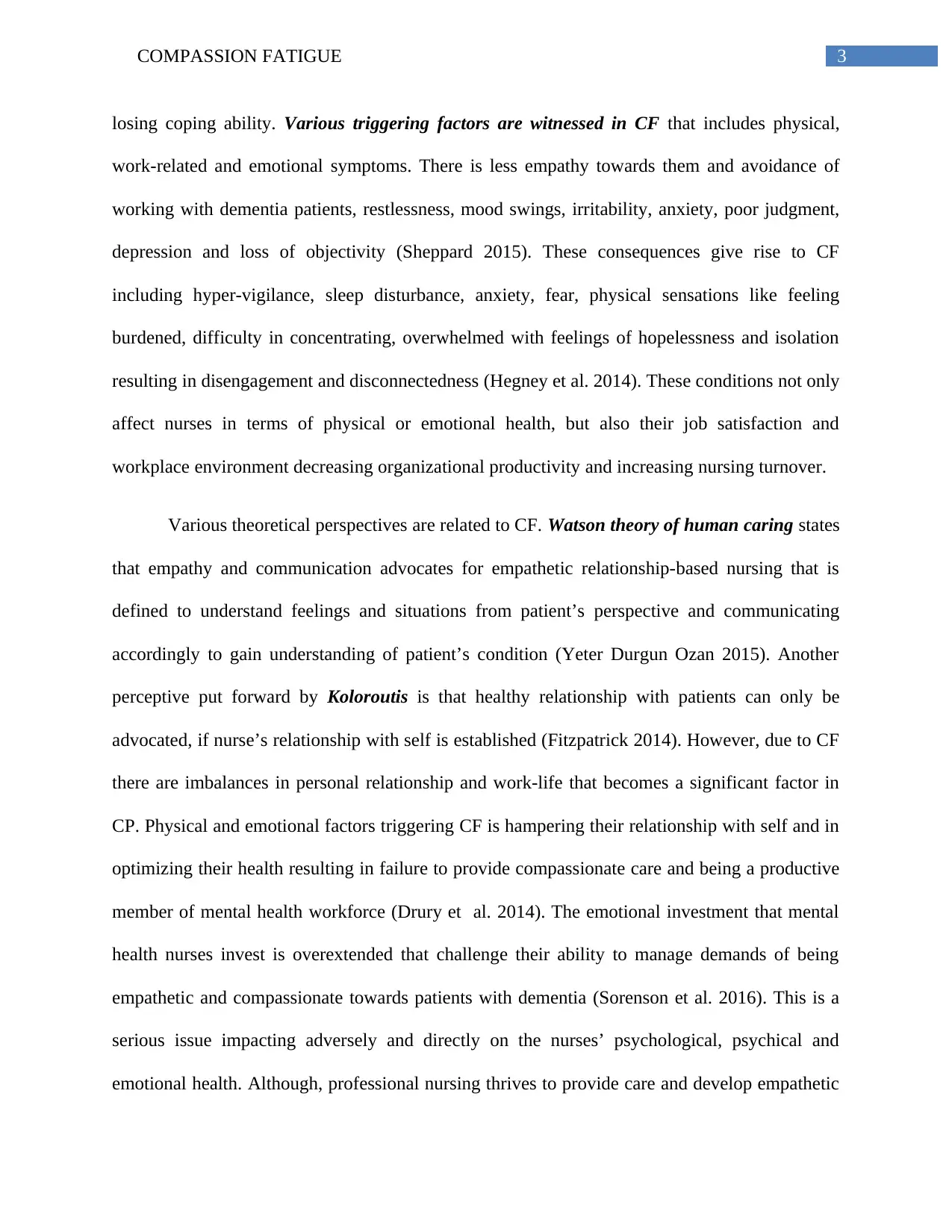
3COMPASSION FATIGUE
losing coping ability. Various triggering factors are witnessed in CF that includes physical,
work-related and emotional symptoms. There is less empathy towards them and avoidance of
working with dementia patients, restlessness, mood swings, irritability, anxiety, poor judgment,
depression and loss of objectivity (Sheppard 2015). These consequences give rise to CF
including hyper-vigilance, sleep disturbance, anxiety, fear, physical sensations like feeling
burdened, difficulty in concentrating, overwhelmed with feelings of hopelessness and isolation
resulting in disengagement and disconnectedness (Hegney et al. 2014). These conditions not only
affect nurses in terms of physical or emotional health, but also their job satisfaction and
workplace environment decreasing organizational productivity and increasing nursing turnover.
Various theoretical perspectives are related to CF. Watson theory of human caring states
that empathy and communication advocates for empathetic relationship-based nursing that is
defined to understand feelings and situations from patient’s perspective and communicating
accordingly to gain understanding of patient’s condition (Yeter Durgun Ozan 2015). Another
perceptive put forward by Koloroutis is that healthy relationship with patients can only be
advocated, if nurse’s relationship with self is established (Fitzpatrick 2014). However, due to CF
there are imbalances in personal relationship and work-life that becomes a significant factor in
CP. Physical and emotional factors triggering CF is hampering their relationship with self and in
optimizing their health resulting in failure to provide compassionate care and being a productive
member of mental health workforce (Drury et al. 2014). The emotional investment that mental
health nurses invest is overextended that challenge their ability to manage demands of being
empathetic and compassionate towards patients with dementia (Sorenson et al. 2016). This is a
serious issue impacting adversely and directly on the nurses’ psychological, psychical and
emotional health. Although, professional nursing thrives to provide care and develop empathetic
losing coping ability. Various triggering factors are witnessed in CF that includes physical,
work-related and emotional symptoms. There is less empathy towards them and avoidance of
working with dementia patients, restlessness, mood swings, irritability, anxiety, poor judgment,
depression and loss of objectivity (Sheppard 2015). These consequences give rise to CF
including hyper-vigilance, sleep disturbance, anxiety, fear, physical sensations like feeling
burdened, difficulty in concentrating, overwhelmed with feelings of hopelessness and isolation
resulting in disengagement and disconnectedness (Hegney et al. 2014). These conditions not only
affect nurses in terms of physical or emotional health, but also their job satisfaction and
workplace environment decreasing organizational productivity and increasing nursing turnover.
Various theoretical perspectives are related to CF. Watson theory of human caring states
that empathy and communication advocates for empathetic relationship-based nursing that is
defined to understand feelings and situations from patient’s perspective and communicating
accordingly to gain understanding of patient’s condition (Yeter Durgun Ozan 2015). Another
perceptive put forward by Koloroutis is that healthy relationship with patients can only be
advocated, if nurse’s relationship with self is established (Fitzpatrick 2014). However, due to CF
there are imbalances in personal relationship and work-life that becomes a significant factor in
CP. Physical and emotional factors triggering CF is hampering their relationship with self and in
optimizing their health resulting in failure to provide compassionate care and being a productive
member of mental health workforce (Drury et al. 2014). The emotional investment that mental
health nurses invest is overextended that challenge their ability to manage demands of being
empathetic and compassionate towards patients with dementia (Sorenson et al. 2016). This is a
serious issue impacting adversely and directly on the nurses’ psychological, psychical and
emotional health. Although, professional nursing thrives to provide care and develop empathetic
Secure Best Marks with AI Grader
Need help grading? Try our AI Grader for instant feedback on your assignments.
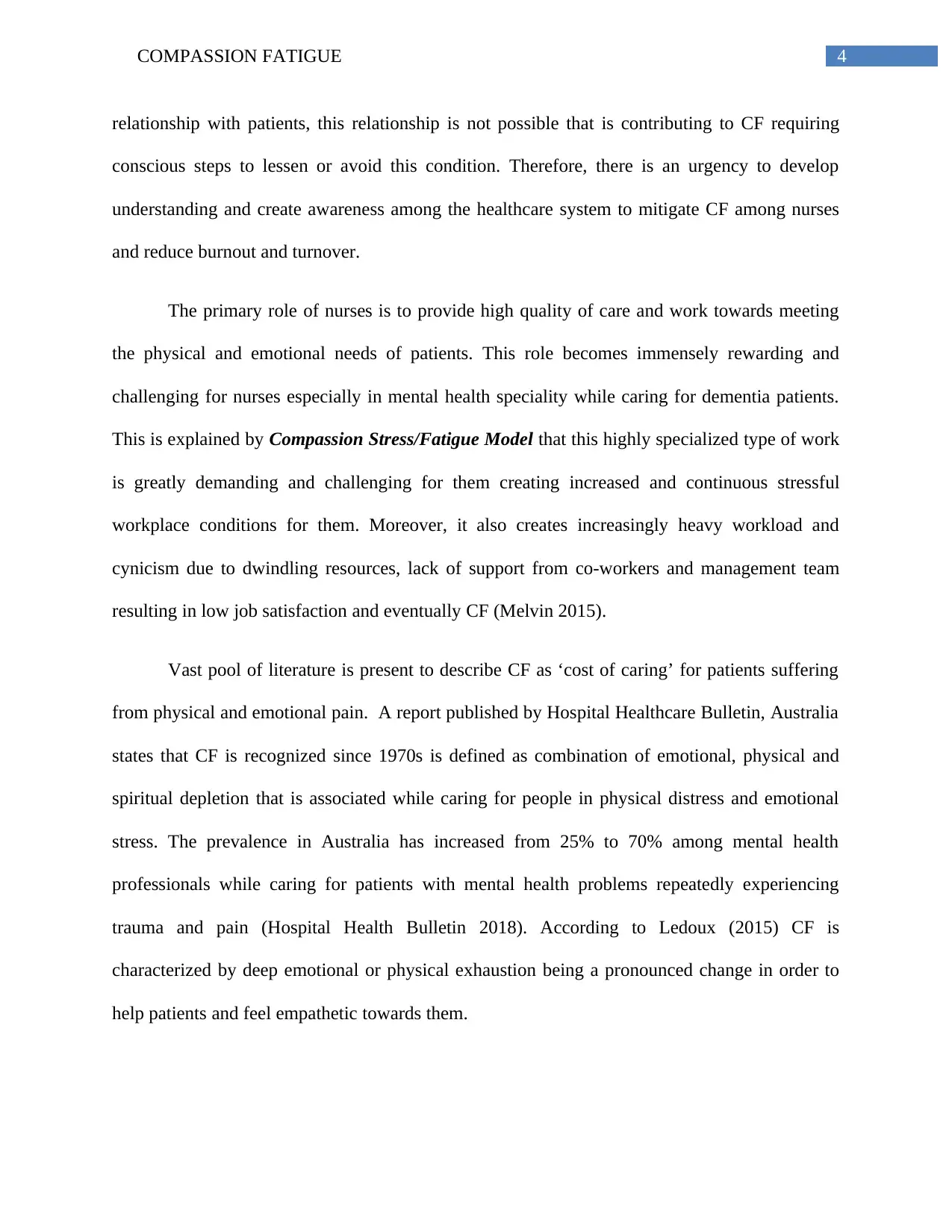
4COMPASSION FATIGUE
relationship with patients, this relationship is not possible that is contributing to CF requiring
conscious steps to lessen or avoid this condition. Therefore, there is an urgency to develop
understanding and create awareness among the healthcare system to mitigate CF among nurses
and reduce burnout and turnover.
The primary role of nurses is to provide high quality of care and work towards meeting
the physical and emotional needs of patients. This role becomes immensely rewarding and
challenging for nurses especially in mental health speciality while caring for dementia patients.
This is explained by Compassion Stress/Fatigue Model that this highly specialized type of work
is greatly demanding and challenging for them creating increased and continuous stressful
workplace conditions for them. Moreover, it also creates increasingly heavy workload and
cynicism due to dwindling resources, lack of support from co-workers and management team
resulting in low job satisfaction and eventually CF (Melvin 2015).
Vast pool of literature is present to describe CF as ‘cost of caring’ for patients suffering
from physical and emotional pain. A report published by Hospital Healthcare Bulletin, Australia
states that CF is recognized since 1970s is defined as combination of emotional, physical and
spiritual depletion that is associated while caring for people in physical distress and emotional
stress. The prevalence in Australia has increased from 25% to 70% among mental health
professionals while caring for patients with mental health problems repeatedly experiencing
trauma and pain (Hospital Health Bulletin 2018). According to Ledoux (2015) CF is
characterized by deep emotional or physical exhaustion being a pronounced change in order to
help patients and feel empathetic towards them.
relationship with patients, this relationship is not possible that is contributing to CF requiring
conscious steps to lessen or avoid this condition. Therefore, there is an urgency to develop
understanding and create awareness among the healthcare system to mitigate CF among nurses
and reduce burnout and turnover.
The primary role of nurses is to provide high quality of care and work towards meeting
the physical and emotional needs of patients. This role becomes immensely rewarding and
challenging for nurses especially in mental health speciality while caring for dementia patients.
This is explained by Compassion Stress/Fatigue Model that this highly specialized type of work
is greatly demanding and challenging for them creating increased and continuous stressful
workplace conditions for them. Moreover, it also creates increasingly heavy workload and
cynicism due to dwindling resources, lack of support from co-workers and management team
resulting in low job satisfaction and eventually CF (Melvin 2015).
Vast pool of literature is present to describe CF as ‘cost of caring’ for patients suffering
from physical and emotional pain. A report published by Hospital Healthcare Bulletin, Australia
states that CF is recognized since 1970s is defined as combination of emotional, physical and
spiritual depletion that is associated while caring for people in physical distress and emotional
stress. The prevalence in Australia has increased from 25% to 70% among mental health
professionals while caring for patients with mental health problems repeatedly experiencing
trauma and pain (Hospital Health Bulletin 2018). According to Ledoux (2015) CF is
characterized by deep emotional or physical exhaustion being a pronounced change in order to
help patients and feel empathetic towards them.
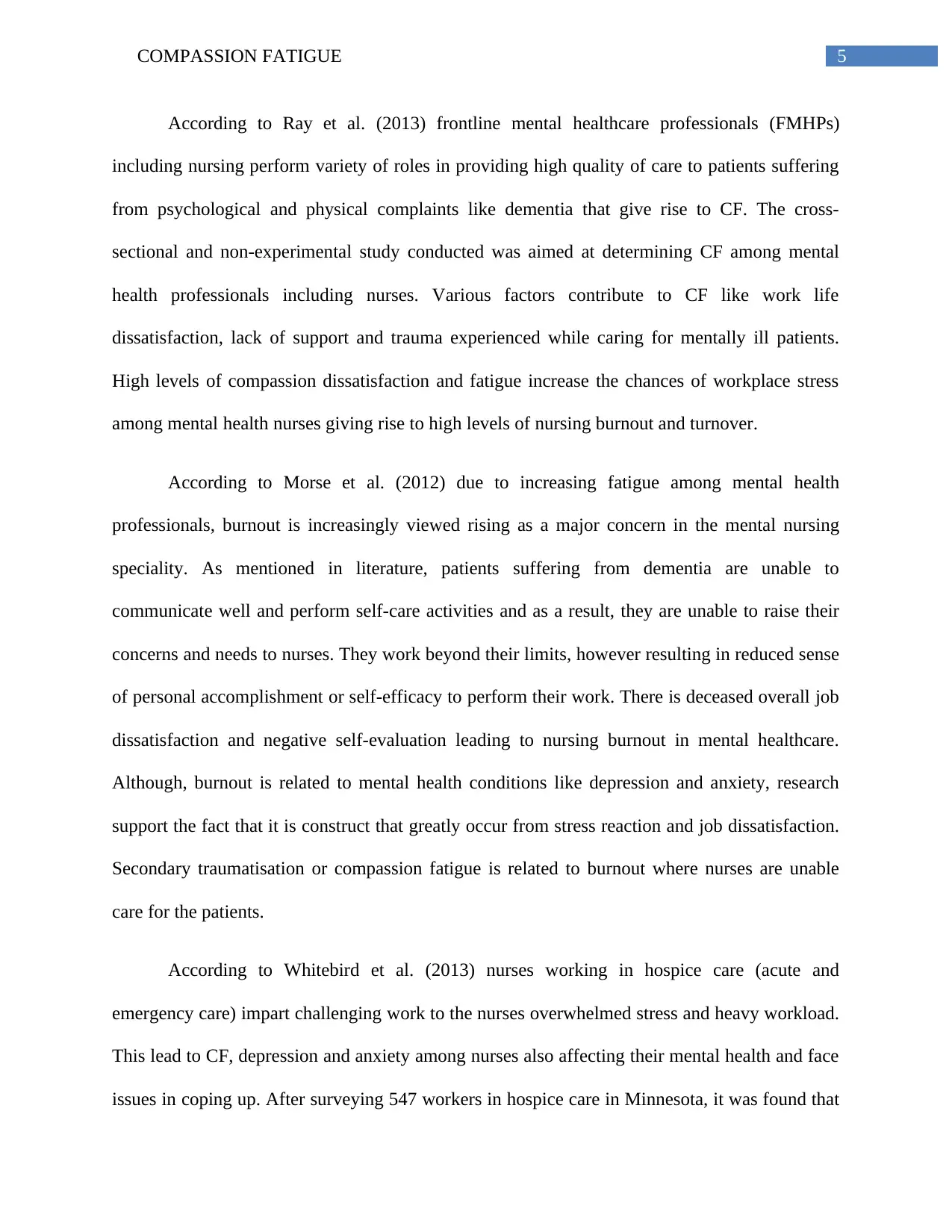
5COMPASSION FATIGUE
According to Ray et al. (2013) frontline mental healthcare professionals (FMHPs)
including nursing perform variety of roles in providing high quality of care to patients suffering
from psychological and physical complaints like dementia that give rise to CF. The cross-
sectional and non-experimental study conducted was aimed at determining CF among mental
health professionals including nurses. Various factors contribute to CF like work life
dissatisfaction, lack of support and trauma experienced while caring for mentally ill patients.
High levels of compassion dissatisfaction and fatigue increase the chances of workplace stress
among mental health nurses giving rise to high levels of nursing burnout and turnover.
According to Morse et al. (2012) due to increasing fatigue among mental health
professionals, burnout is increasingly viewed rising as a major concern in the mental nursing
speciality. As mentioned in literature, patients suffering from dementia are unable to
communicate well and perform self-care activities and as a result, they are unable to raise their
concerns and needs to nurses. They work beyond their limits, however resulting in reduced sense
of personal accomplishment or self-efficacy to perform their work. There is deceased overall job
dissatisfaction and negative self-evaluation leading to nursing burnout in mental healthcare.
Although, burnout is related to mental health conditions like depression and anxiety, research
support the fact that it is construct that greatly occur from stress reaction and job dissatisfaction.
Secondary traumatisation or compassion fatigue is related to burnout where nurses are unable
care for the patients.
According to Whitebird et al. (2013) nurses working in hospice care (acute and
emergency care) impart challenging work to the nurses overwhelmed stress and heavy workload.
This lead to CF, depression and anxiety among nurses also affecting their mental health and face
issues in coping up. After surveying 547 workers in hospice care in Minnesota, it was found that
According to Ray et al. (2013) frontline mental healthcare professionals (FMHPs)
including nursing perform variety of roles in providing high quality of care to patients suffering
from psychological and physical complaints like dementia that give rise to CF. The cross-
sectional and non-experimental study conducted was aimed at determining CF among mental
health professionals including nurses. Various factors contribute to CF like work life
dissatisfaction, lack of support and trauma experienced while caring for mentally ill patients.
High levels of compassion dissatisfaction and fatigue increase the chances of workplace stress
among mental health nurses giving rise to high levels of nursing burnout and turnover.
According to Morse et al. (2012) due to increasing fatigue among mental health
professionals, burnout is increasingly viewed rising as a major concern in the mental nursing
speciality. As mentioned in literature, patients suffering from dementia are unable to
communicate well and perform self-care activities and as a result, they are unable to raise their
concerns and needs to nurses. They work beyond their limits, however resulting in reduced sense
of personal accomplishment or self-efficacy to perform their work. There is deceased overall job
dissatisfaction and negative self-evaluation leading to nursing burnout in mental healthcare.
Although, burnout is related to mental health conditions like depression and anxiety, research
support the fact that it is construct that greatly occur from stress reaction and job dissatisfaction.
Secondary traumatisation or compassion fatigue is related to burnout where nurses are unable
care for the patients.
According to Whitebird et al. (2013) nurses working in hospice care (acute and
emergency care) impart challenging work to the nurses overwhelmed stress and heavy workload.
This lead to CF, depression and anxiety among nurses also affecting their mental health and face
issues in coping up. After surveying 547 workers in hospice care in Minnesota, it was found that
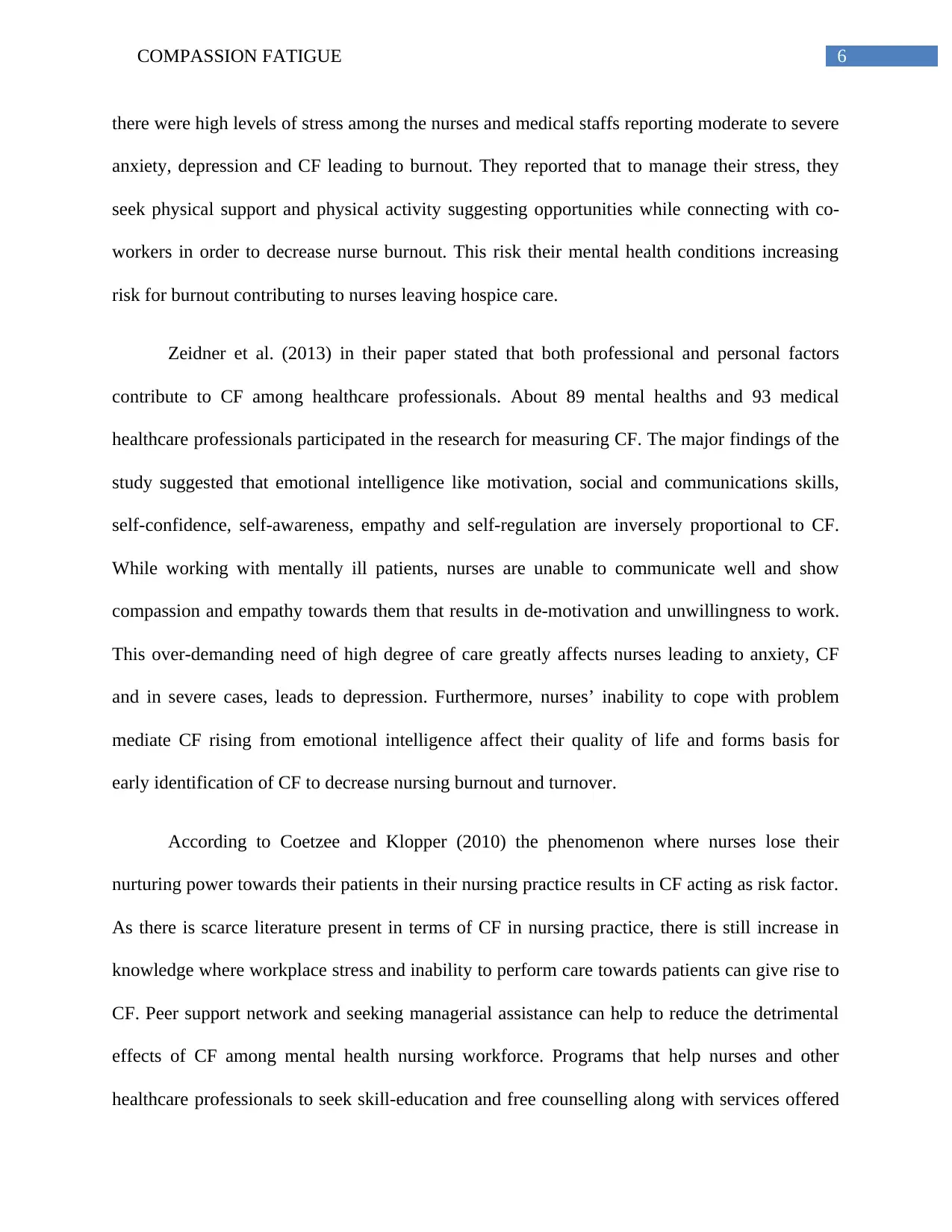
6COMPASSION FATIGUE
there were high levels of stress among the nurses and medical staffs reporting moderate to severe
anxiety, depression and CF leading to burnout. They reported that to manage their stress, they
seek physical support and physical activity suggesting opportunities while connecting with co-
workers in order to decrease nurse burnout. This risk their mental health conditions increasing
risk for burnout contributing to nurses leaving hospice care.
Zeidner et al. (2013) in their paper stated that both professional and personal factors
contribute to CF among healthcare professionals. About 89 mental healths and 93 medical
healthcare professionals participated in the research for measuring CF. The major findings of the
study suggested that emotional intelligence like motivation, social and communications skills,
self-confidence, self-awareness, empathy and self-regulation are inversely proportional to CF.
While working with mentally ill patients, nurses are unable to communicate well and show
compassion and empathy towards them that results in de-motivation and unwillingness to work.
This over-demanding need of high degree of care greatly affects nurses leading to anxiety, CF
and in severe cases, leads to depression. Furthermore, nurses’ inability to cope with problem
mediate CF rising from emotional intelligence affect their quality of life and forms basis for
early identification of CF to decrease nursing burnout and turnover.
According to Coetzee and Klopper (2010) the phenomenon where nurses lose their
nurturing power towards their patients in their nursing practice results in CF acting as risk factor.
As there is scarce literature present in terms of CF in nursing practice, there is still increase in
knowledge where workplace stress and inability to perform care towards patients can give rise to
CF. Peer support network and seeking managerial assistance can help to reduce the detrimental
effects of CF among mental health nursing workforce. Programs that help nurses and other
healthcare professionals to seek skill-education and free counselling along with services offered
there were high levels of stress among the nurses and medical staffs reporting moderate to severe
anxiety, depression and CF leading to burnout. They reported that to manage their stress, they
seek physical support and physical activity suggesting opportunities while connecting with co-
workers in order to decrease nurse burnout. This risk their mental health conditions increasing
risk for burnout contributing to nurses leaving hospice care.
Zeidner et al. (2013) in their paper stated that both professional and personal factors
contribute to CF among healthcare professionals. About 89 mental healths and 93 medical
healthcare professionals participated in the research for measuring CF. The major findings of the
study suggested that emotional intelligence like motivation, social and communications skills,
self-confidence, self-awareness, empathy and self-regulation are inversely proportional to CF.
While working with mentally ill patients, nurses are unable to communicate well and show
compassion and empathy towards them that results in de-motivation and unwillingness to work.
This over-demanding need of high degree of care greatly affects nurses leading to anxiety, CF
and in severe cases, leads to depression. Furthermore, nurses’ inability to cope with problem
mediate CF rising from emotional intelligence affect their quality of life and forms basis for
early identification of CF to decrease nursing burnout and turnover.
According to Coetzee and Klopper (2010) the phenomenon where nurses lose their
nurturing power towards their patients in their nursing practice results in CF acting as risk factor.
As there is scarce literature present in terms of CF in nursing practice, there is still increase in
knowledge where workplace stress and inability to perform care towards patients can give rise to
CF. Peer support network and seeking managerial assistance can help to reduce the detrimental
effects of CF among mental health nursing workforce. Programs that help nurses and other
healthcare professionals to seek skill-education and free counselling along with services offered
Paraphrase This Document
Need a fresh take? Get an instant paraphrase of this document with our AI Paraphraser
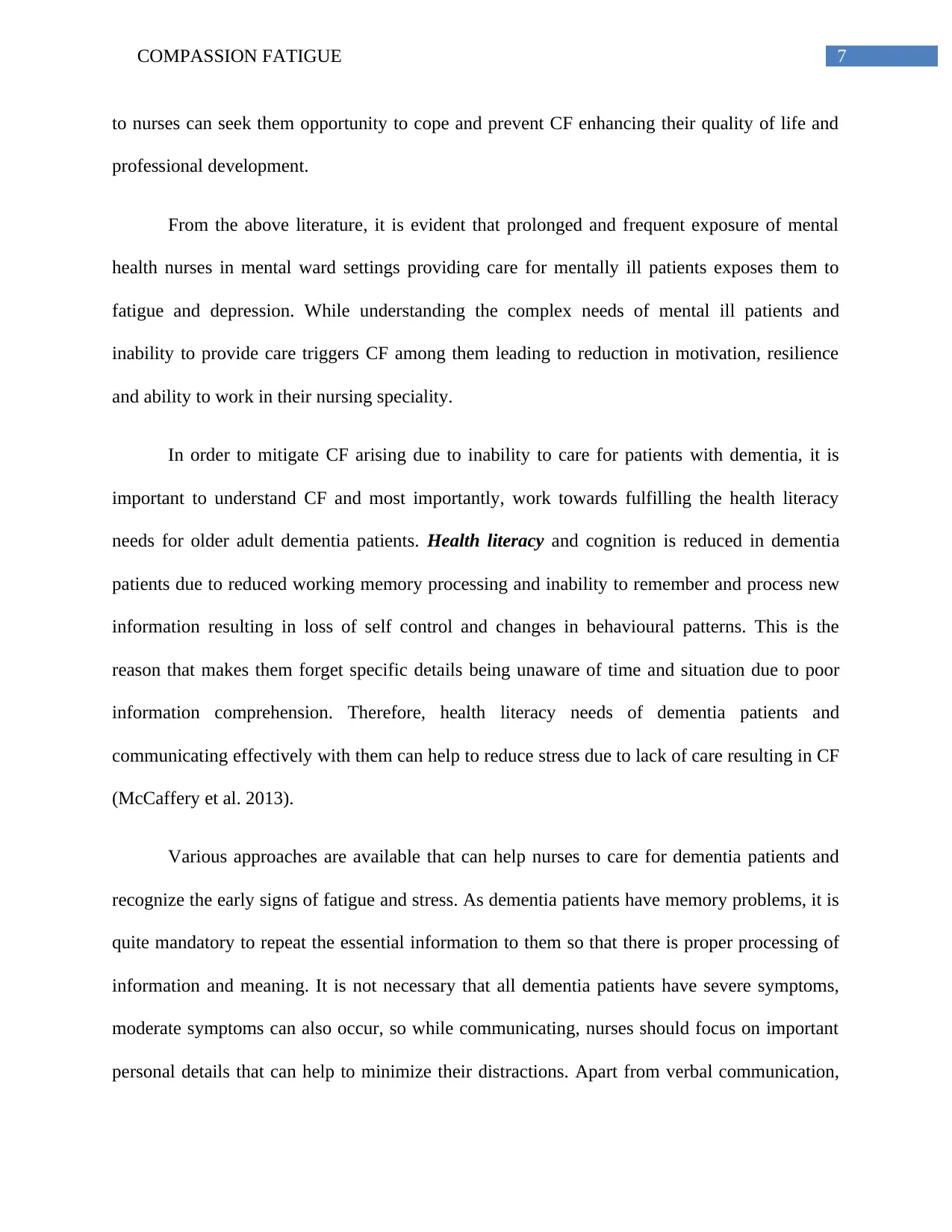
7COMPASSION FATIGUE
to nurses can seek them opportunity to cope and prevent CF enhancing their quality of life and
professional development.
From the above literature, it is evident that prolonged and frequent exposure of mental
health nurses in mental ward settings providing care for mentally ill patients exposes them to
fatigue and depression. While understanding the complex needs of mental ill patients and
inability to provide care triggers CF among them leading to reduction in motivation, resilience
and ability to work in their nursing speciality.
In order to mitigate CF arising due to inability to care for patients with dementia, it is
important to understand CF and most importantly, work towards fulfilling the health literacy
needs for older adult dementia patients. Health literacy and cognition is reduced in dementia
patients due to reduced working memory processing and inability to remember and process new
information resulting in loss of self control and changes in behavioural patterns. This is the
reason that makes them forget specific details being unaware of time and situation due to poor
information comprehension. Therefore, health literacy needs of dementia patients and
communicating effectively with them can help to reduce stress due to lack of care resulting in CF
(McCaffery et al. 2013).
Various approaches are available that can help nurses to care for dementia patients and
recognize the early signs of fatigue and stress. As dementia patients have memory problems, it is
quite mandatory to repeat the essential information to them so that there is proper processing of
information and meaning. It is not necessary that all dementia patients have severe symptoms,
moderate symptoms can also occur, so while communicating, nurses should focus on important
personal details that can help to minimize their distractions. Apart from verbal communication,
to nurses can seek them opportunity to cope and prevent CF enhancing their quality of life and
professional development.
From the above literature, it is evident that prolonged and frequent exposure of mental
health nurses in mental ward settings providing care for mentally ill patients exposes them to
fatigue and depression. While understanding the complex needs of mental ill patients and
inability to provide care triggers CF among them leading to reduction in motivation, resilience
and ability to work in their nursing speciality.
In order to mitigate CF arising due to inability to care for patients with dementia, it is
important to understand CF and most importantly, work towards fulfilling the health literacy
needs for older adult dementia patients. Health literacy and cognition is reduced in dementia
patients due to reduced working memory processing and inability to remember and process new
information resulting in loss of self control and changes in behavioural patterns. This is the
reason that makes them forget specific details being unaware of time and situation due to poor
information comprehension. Therefore, health literacy needs of dementia patients and
communicating effectively with them can help to reduce stress due to lack of care resulting in CF
(McCaffery et al. 2013).
Various approaches are available that can help nurses to care for dementia patients and
recognize the early signs of fatigue and stress. As dementia patients have memory problems, it is
quite mandatory to repeat the essential information to them so that there is proper processing of
information and meaning. It is not necessary that all dementia patients have severe symptoms,
moderate symptoms can also occur, so while communicating, nurses should focus on important
personal details that can help to minimize their distractions. Apart from verbal communication,
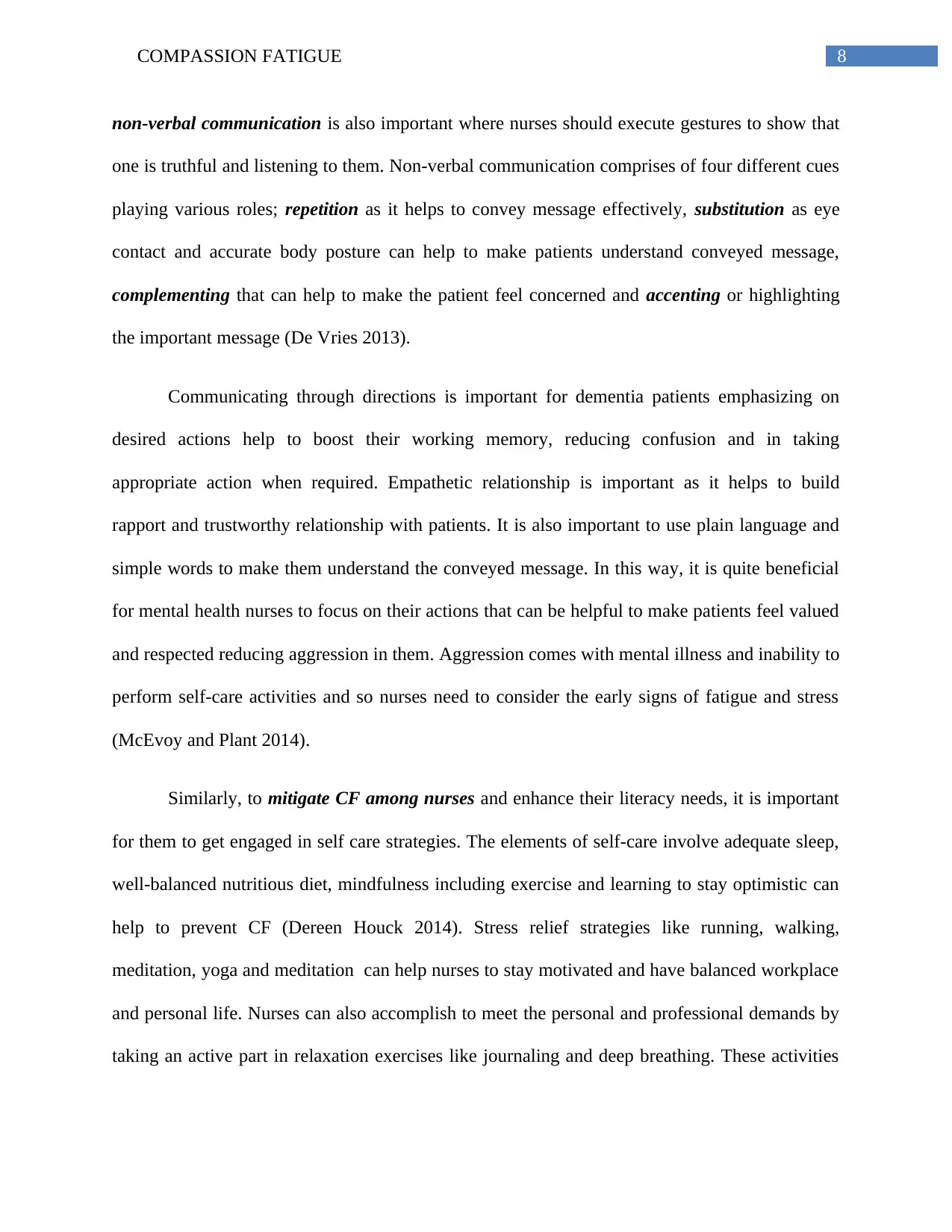
8COMPASSION FATIGUE
non-verbal communication is also important where nurses should execute gestures to show that
one is truthful and listening to them. Non-verbal communication comprises of four different cues
playing various roles; repetition as it helps to convey message effectively, substitution as eye
contact and accurate body posture can help to make patients understand conveyed message,
complementing that can help to make the patient feel concerned and accenting or highlighting
the important message (De Vries 2013).
Communicating through directions is important for dementia patients emphasizing on
desired actions help to boost their working memory, reducing confusion and in taking
appropriate action when required. Empathetic relationship is important as it helps to build
rapport and trustworthy relationship with patients. It is also important to use plain language and
simple words to make them understand the conveyed message. In this way, it is quite beneficial
for mental health nurses to focus on their actions that can be helpful to make patients feel valued
and respected reducing aggression in them. Aggression comes with mental illness and inability to
perform self-care activities and so nurses need to consider the early signs of fatigue and stress
(McEvoy and Plant 2014).
Similarly, to mitigate CF among nurses and enhance their literacy needs, it is important
for them to get engaged in self care strategies. The elements of self-care involve adequate sleep,
well-balanced nutritious diet, mindfulness including exercise and learning to stay optimistic can
help to prevent CF (Dereen Houck 2014). Stress relief strategies like running, walking,
meditation, yoga and meditation can help nurses to stay motivated and have balanced workplace
and personal life. Nurses can also accomplish to meet the personal and professional demands by
taking an active part in relaxation exercises like journaling and deep breathing. These activities
non-verbal communication is also important where nurses should execute gestures to show that
one is truthful and listening to them. Non-verbal communication comprises of four different cues
playing various roles; repetition as it helps to convey message effectively, substitution as eye
contact and accurate body posture can help to make patients understand conveyed message,
complementing that can help to make the patient feel concerned and accenting or highlighting
the important message (De Vries 2013).
Communicating through directions is important for dementia patients emphasizing on
desired actions help to boost their working memory, reducing confusion and in taking
appropriate action when required. Empathetic relationship is important as it helps to build
rapport and trustworthy relationship with patients. It is also important to use plain language and
simple words to make them understand the conveyed message. In this way, it is quite beneficial
for mental health nurses to focus on their actions that can be helpful to make patients feel valued
and respected reducing aggression in them. Aggression comes with mental illness and inability to
perform self-care activities and so nurses need to consider the early signs of fatigue and stress
(McEvoy and Plant 2014).
Similarly, to mitigate CF among nurses and enhance their literacy needs, it is important
for them to get engaged in self care strategies. The elements of self-care involve adequate sleep,
well-balanced nutritious diet, mindfulness including exercise and learning to stay optimistic can
help to prevent CF (Dereen Houck 2014). Stress relief strategies like running, walking,
meditation, yoga and meditation can help nurses to stay motivated and have balanced workplace
and personal life. Nurses can also accomplish to meet the personal and professional demands by
taking an active part in relaxation exercises like journaling and deep breathing. These activities
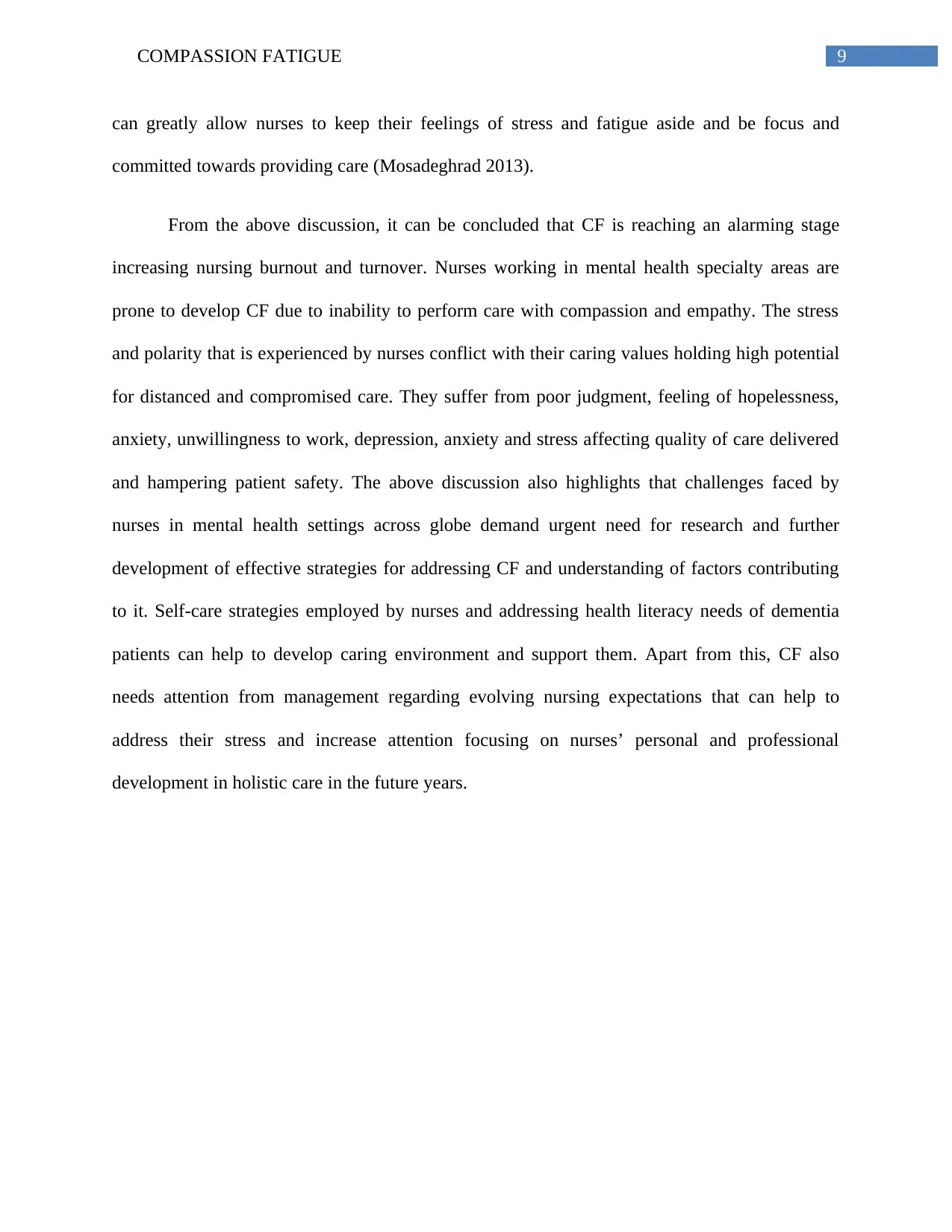
9COMPASSION FATIGUE
can greatly allow nurses to keep their feelings of stress and fatigue aside and be focus and
committed towards providing care (Mosadeghrad 2013).
From the above discussion, it can be concluded that CF is reaching an alarming stage
increasing nursing burnout and turnover. Nurses working in mental health specialty areas are
prone to develop CF due to inability to perform care with compassion and empathy. The stress
and polarity that is experienced by nurses conflict with their caring values holding high potential
for distanced and compromised care. They suffer from poor judgment, feeling of hopelessness,
anxiety, unwillingness to work, depression, anxiety and stress affecting quality of care delivered
and hampering patient safety. The above discussion also highlights that challenges faced by
nurses in mental health settings across globe demand urgent need for research and further
development of effective strategies for addressing CF and understanding of factors contributing
to it. Self-care strategies employed by nurses and addressing health literacy needs of dementia
patients can help to develop caring environment and support them. Apart from this, CF also
needs attention from management regarding evolving nursing expectations that can help to
address their stress and increase attention focusing on nurses’ personal and professional
development in holistic care in the future years.
can greatly allow nurses to keep their feelings of stress and fatigue aside and be focus and
committed towards providing care (Mosadeghrad 2013).
From the above discussion, it can be concluded that CF is reaching an alarming stage
increasing nursing burnout and turnover. Nurses working in mental health specialty areas are
prone to develop CF due to inability to perform care with compassion and empathy. The stress
and polarity that is experienced by nurses conflict with their caring values holding high potential
for distanced and compromised care. They suffer from poor judgment, feeling of hopelessness,
anxiety, unwillingness to work, depression, anxiety and stress affecting quality of care delivered
and hampering patient safety. The above discussion also highlights that challenges faced by
nurses in mental health settings across globe demand urgent need for research and further
development of effective strategies for addressing CF and understanding of factors contributing
to it. Self-care strategies employed by nurses and addressing health literacy needs of dementia
patients can help to develop caring environment and support them. Apart from this, CF also
needs attention from management regarding evolving nursing expectations that can help to
address their stress and increase attention focusing on nurses’ personal and professional
development in holistic care in the future years.
Secure Best Marks with AI Grader
Need help grading? Try our AI Grader for instant feedback on your assignments.
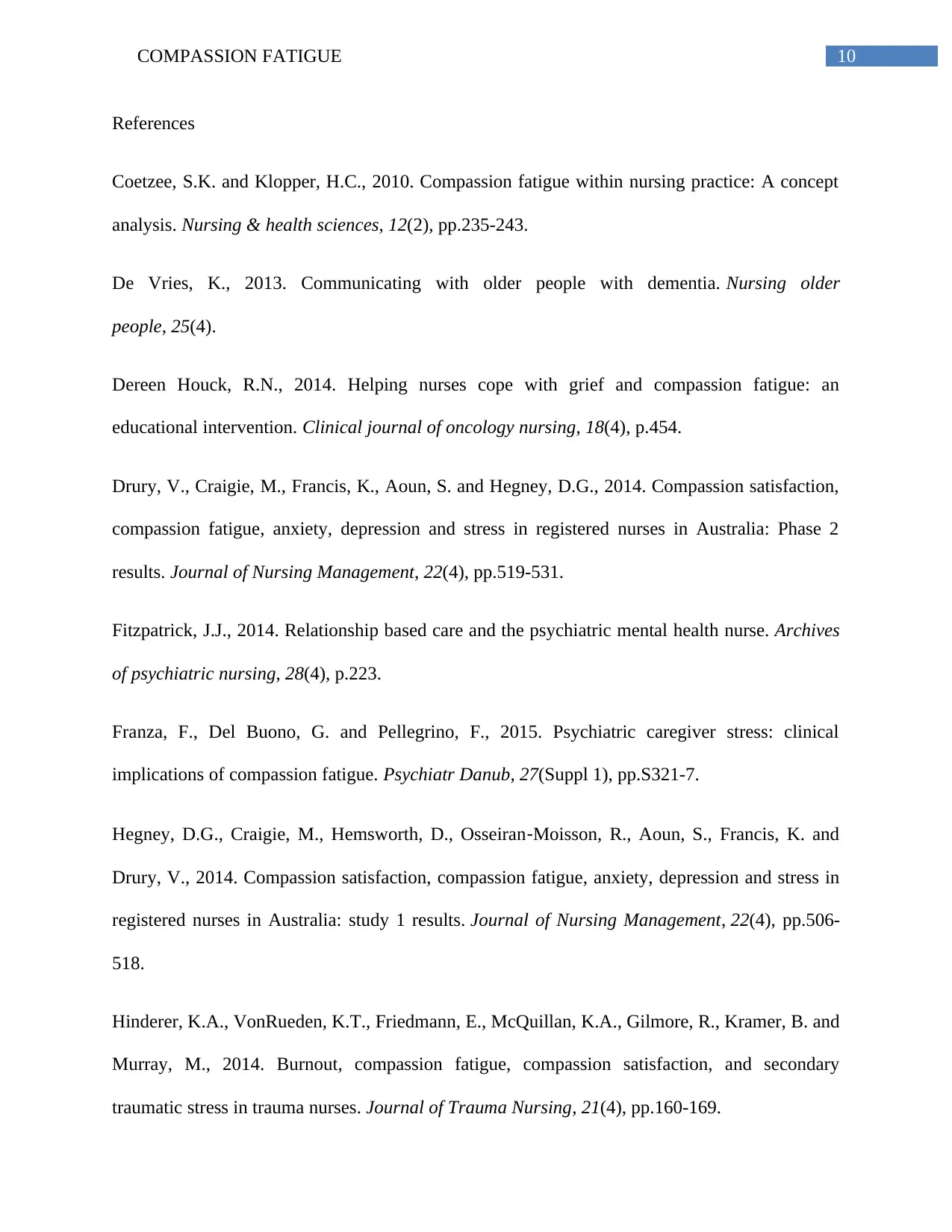
10COMPASSION FATIGUE
References
Coetzee, S.K. and Klopper, H.C., 2010. Compassion fatigue within nursing practice: A concept
analysis. Nursing & health sciences, 12(2), pp.235-243.
De Vries, K., 2013. Communicating with older people with dementia. Nursing older
people, 25(4).
Dereen Houck, R.N., 2014. Helping nurses cope with grief and compassion fatigue: an
educational intervention. Clinical journal of oncology nursing, 18(4), p.454.
Drury, V., Craigie, M., Francis, K., Aoun, S. and Hegney, D.G., 2014. Compassion satisfaction,
compassion fatigue, anxiety, depression and stress in registered nurses in Australia: Phase 2
results. Journal of Nursing Management, 22(4), pp.519-531.
Fitzpatrick, J.J., 2014. Relationship based care and the psychiatric mental health nurse. Archives
of psychiatric nursing, 28(4), p.223.
Franza, F., Del Buono, G. and Pellegrino, F., 2015. Psychiatric caregiver stress: clinical
implications of compassion fatigue. Psychiatr Danub, 27(Suppl 1), pp.S321-7.
Hegney, D.G., Craigie, M., Hemsworth, D., Osseiran‐Moisson, R., Aoun, S., Francis, K. and
Drury, V., 2014. Compassion satisfaction, compassion fatigue, anxiety, depression and stress in
registered nurses in Australia: study 1 results. Journal of Nursing Management, 22(4), pp.506-
518.
Hinderer, K.A., VonRueden, K.T., Friedmann, E., McQuillan, K.A., Gilmore, R., Kramer, B. and
Murray, M., 2014. Burnout, compassion fatigue, compassion satisfaction, and secondary
traumatic stress in trauma nurses. Journal of Trauma Nursing, 21(4), pp.160-169.
References
Coetzee, S.K. and Klopper, H.C., 2010. Compassion fatigue within nursing practice: A concept
analysis. Nursing & health sciences, 12(2), pp.235-243.
De Vries, K., 2013. Communicating with older people with dementia. Nursing older
people, 25(4).
Dereen Houck, R.N., 2014. Helping nurses cope with grief and compassion fatigue: an
educational intervention. Clinical journal of oncology nursing, 18(4), p.454.
Drury, V., Craigie, M., Francis, K., Aoun, S. and Hegney, D.G., 2014. Compassion satisfaction,
compassion fatigue, anxiety, depression and stress in registered nurses in Australia: Phase 2
results. Journal of Nursing Management, 22(4), pp.519-531.
Fitzpatrick, J.J., 2014. Relationship based care and the psychiatric mental health nurse. Archives
of psychiatric nursing, 28(4), p.223.
Franza, F., Del Buono, G. and Pellegrino, F., 2015. Psychiatric caregiver stress: clinical
implications of compassion fatigue. Psychiatr Danub, 27(Suppl 1), pp.S321-7.
Hegney, D.G., Craigie, M., Hemsworth, D., Osseiran‐Moisson, R., Aoun, S., Francis, K. and
Drury, V., 2014. Compassion satisfaction, compassion fatigue, anxiety, depression and stress in
registered nurses in Australia: study 1 results. Journal of Nursing Management, 22(4), pp.506-
518.
Hinderer, K.A., VonRueden, K.T., Friedmann, E., McQuillan, K.A., Gilmore, R., Kramer, B. and
Murray, M., 2014. Burnout, compassion fatigue, compassion satisfaction, and secondary
traumatic stress in trauma nurses. Journal of Trauma Nursing, 21(4), pp.160-169.
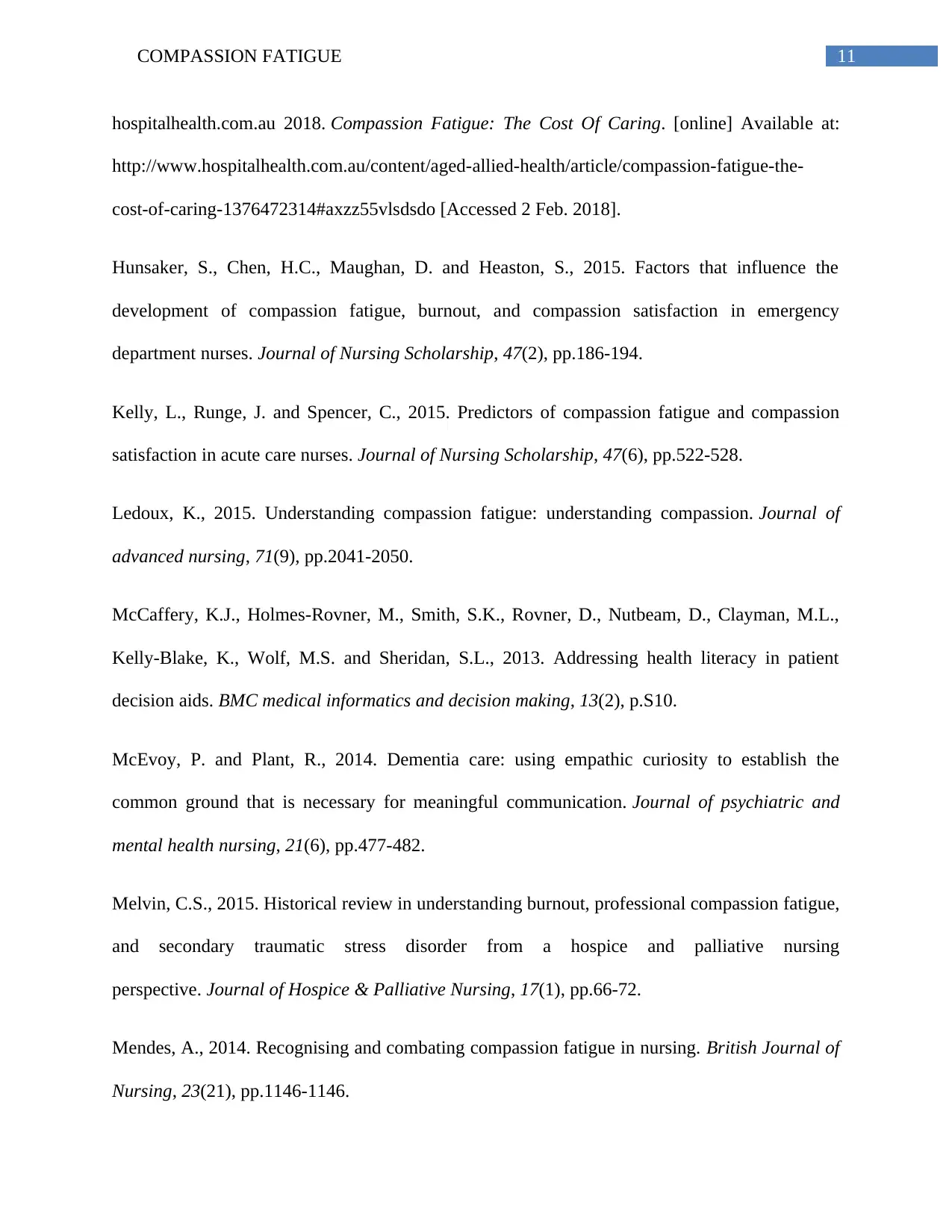
11COMPASSION FATIGUE
hospitalhealth.com.au 2018. Compassion Fatigue: The Cost Of Caring. [online] Available at:
http://www.hospitalhealth.com.au/content/aged-allied-health/article/compassion-fatigue-the-
cost-of-caring-1376472314#axzz55vlsdsdo [Accessed 2 Feb. 2018].
Hunsaker, S., Chen, H.C., Maughan, D. and Heaston, S., 2015. Factors that influence the
development of compassion fatigue, burnout, and compassion satisfaction in emergency
department nurses. Journal of Nursing Scholarship, 47(2), pp.186-194.
Kelly, L., Runge, J. and Spencer, C., 2015. Predictors of compassion fatigue and compassion
satisfaction in acute care nurses. Journal of Nursing Scholarship, 47(6), pp.522-528.
Ledoux, K., 2015. Understanding compassion fatigue: understanding compassion. Journal of
advanced nursing, 71(9), pp.2041-2050.
McCaffery, K.J., Holmes-Rovner, M., Smith, S.K., Rovner, D., Nutbeam, D., Clayman, M.L.,
Kelly-Blake, K., Wolf, M.S. and Sheridan, S.L., 2013. Addressing health literacy in patient
decision aids. BMC medical informatics and decision making, 13(2), p.S10.
McEvoy, P. and Plant, R., 2014. Dementia care: using empathic curiosity to establish the
common ground that is necessary for meaningful communication. Journal of psychiatric and
mental health nursing, 21(6), pp.477-482.
Melvin, C.S., 2015. Historical review in understanding burnout, professional compassion fatigue,
and secondary traumatic stress disorder from a hospice and palliative nursing
perspective. Journal of Hospice & Palliative Nursing, 17(1), pp.66-72.
Mendes, A., 2014. Recognising and combating compassion fatigue in nursing. British Journal of
Nursing, 23(21), pp.1146-1146.
hospitalhealth.com.au 2018. Compassion Fatigue: The Cost Of Caring. [online] Available at:
http://www.hospitalhealth.com.au/content/aged-allied-health/article/compassion-fatigue-the-
cost-of-caring-1376472314#axzz55vlsdsdo [Accessed 2 Feb. 2018].
Hunsaker, S., Chen, H.C., Maughan, D. and Heaston, S., 2015. Factors that influence the
development of compassion fatigue, burnout, and compassion satisfaction in emergency
department nurses. Journal of Nursing Scholarship, 47(2), pp.186-194.
Kelly, L., Runge, J. and Spencer, C., 2015. Predictors of compassion fatigue and compassion
satisfaction in acute care nurses. Journal of Nursing Scholarship, 47(6), pp.522-528.
Ledoux, K., 2015. Understanding compassion fatigue: understanding compassion. Journal of
advanced nursing, 71(9), pp.2041-2050.
McCaffery, K.J., Holmes-Rovner, M., Smith, S.K., Rovner, D., Nutbeam, D., Clayman, M.L.,
Kelly-Blake, K., Wolf, M.S. and Sheridan, S.L., 2013. Addressing health literacy in patient
decision aids. BMC medical informatics and decision making, 13(2), p.S10.
McEvoy, P. and Plant, R., 2014. Dementia care: using empathic curiosity to establish the
common ground that is necessary for meaningful communication. Journal of psychiatric and
mental health nursing, 21(6), pp.477-482.
Melvin, C.S., 2015. Historical review in understanding burnout, professional compassion fatigue,
and secondary traumatic stress disorder from a hospice and palliative nursing
perspective. Journal of Hospice & Palliative Nursing, 17(1), pp.66-72.
Mendes, A., 2014. Recognising and combating compassion fatigue in nursing. British Journal of
Nursing, 23(21), pp.1146-1146.
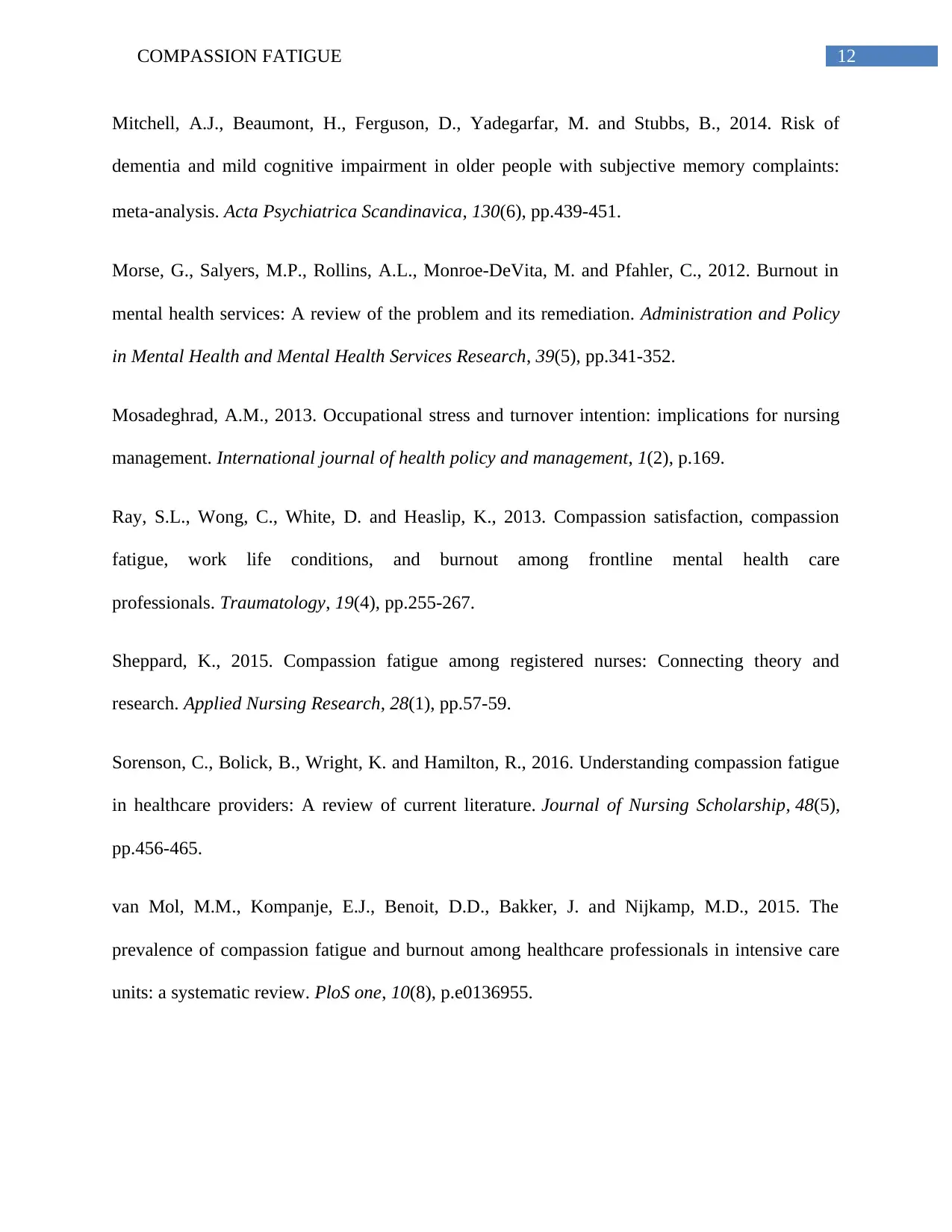
12COMPASSION FATIGUE
Mitchell, A.J., Beaumont, H., Ferguson, D., Yadegarfar, M. and Stubbs, B., 2014. Risk of
dementia and mild cognitive impairment in older people with subjective memory complaints:
meta‐analysis. Acta Psychiatrica Scandinavica, 130(6), pp.439-451.
Morse, G., Salyers, M.P., Rollins, A.L., Monroe-DeVita, M. and Pfahler, C., 2012. Burnout in
mental health services: A review of the problem and its remediation. Administration and Policy
in Mental Health and Mental Health Services Research, 39(5), pp.341-352.
Mosadeghrad, A.M., 2013. Occupational stress and turnover intention: implications for nursing
management. International journal of health policy and management, 1(2), p.169.
Ray, S.L., Wong, C., White, D. and Heaslip, K., 2013. Compassion satisfaction, compassion
fatigue, work life conditions, and burnout among frontline mental health care
professionals. Traumatology, 19(4), pp.255-267.
Sheppard, K., 2015. Compassion fatigue among registered nurses: Connecting theory and
research. Applied Nursing Research, 28(1), pp.57-59.
Sorenson, C., Bolick, B., Wright, K. and Hamilton, R., 2016. Understanding compassion fatigue
in healthcare providers: A review of current literature. Journal of Nursing Scholarship, 48(5),
pp.456-465.
van Mol, M.M., Kompanje, E.J., Benoit, D.D., Bakker, J. and Nijkamp, M.D., 2015. The
prevalence of compassion fatigue and burnout among healthcare professionals in intensive care
units: a systematic review. PloS one, 10(8), p.e0136955.
Mitchell, A.J., Beaumont, H., Ferguson, D., Yadegarfar, M. and Stubbs, B., 2014. Risk of
dementia and mild cognitive impairment in older people with subjective memory complaints:
meta‐analysis. Acta Psychiatrica Scandinavica, 130(6), pp.439-451.
Morse, G., Salyers, M.P., Rollins, A.L., Monroe-DeVita, M. and Pfahler, C., 2012. Burnout in
mental health services: A review of the problem and its remediation. Administration and Policy
in Mental Health and Mental Health Services Research, 39(5), pp.341-352.
Mosadeghrad, A.M., 2013. Occupational stress and turnover intention: implications for nursing
management. International journal of health policy and management, 1(2), p.169.
Ray, S.L., Wong, C., White, D. and Heaslip, K., 2013. Compassion satisfaction, compassion
fatigue, work life conditions, and burnout among frontline mental health care
professionals. Traumatology, 19(4), pp.255-267.
Sheppard, K., 2015. Compassion fatigue among registered nurses: Connecting theory and
research. Applied Nursing Research, 28(1), pp.57-59.
Sorenson, C., Bolick, B., Wright, K. and Hamilton, R., 2016. Understanding compassion fatigue
in healthcare providers: A review of current literature. Journal of Nursing Scholarship, 48(5),
pp.456-465.
van Mol, M.M., Kompanje, E.J., Benoit, D.D., Bakker, J. and Nijkamp, M.D., 2015. The
prevalence of compassion fatigue and burnout among healthcare professionals in intensive care
units: a systematic review. PloS one, 10(8), p.e0136955.
Paraphrase This Document
Need a fresh take? Get an instant paraphrase of this document with our AI Paraphraser
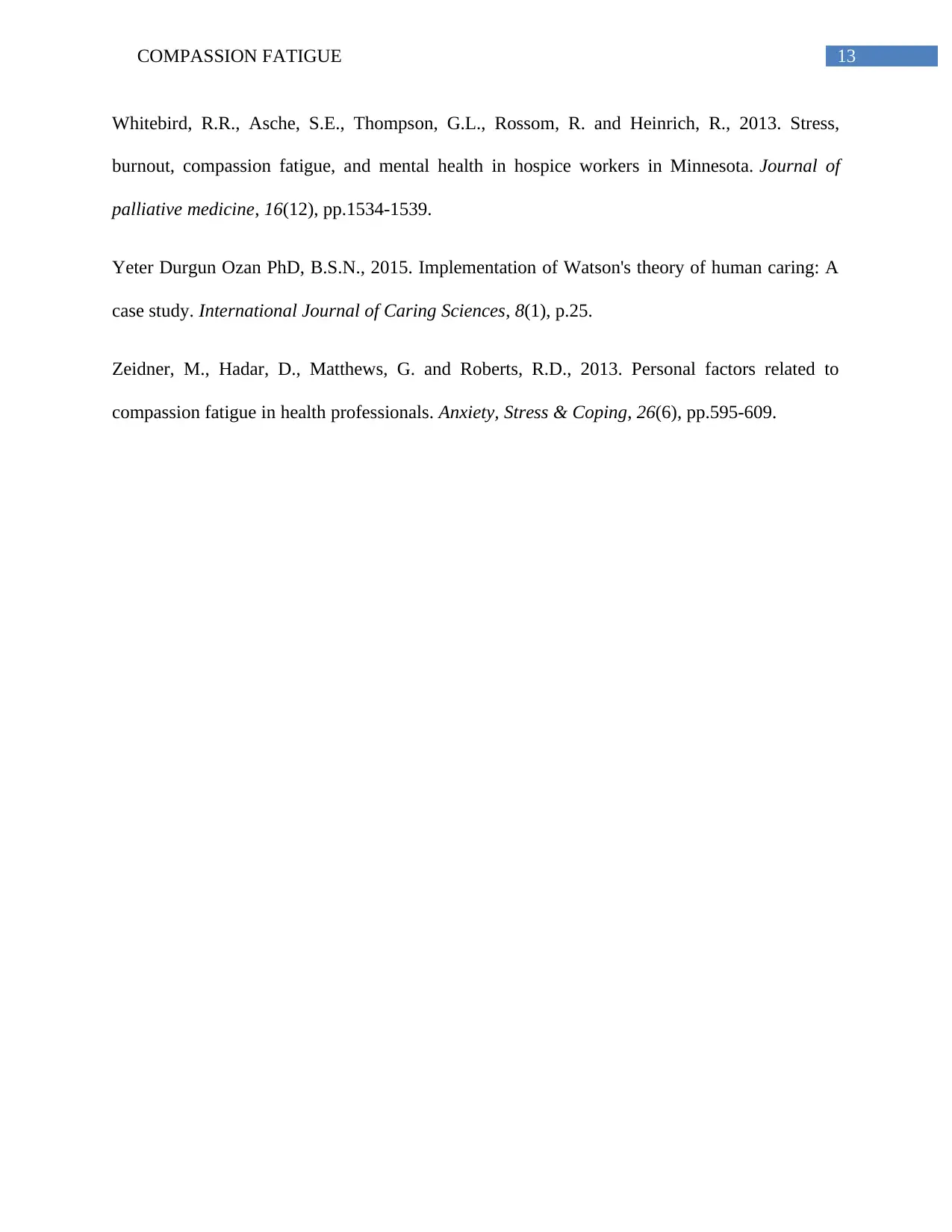
13COMPASSION FATIGUE
Whitebird, R.R., Asche, S.E., Thompson, G.L., Rossom, R. and Heinrich, R., 2013. Stress,
burnout, compassion fatigue, and mental health in hospice workers in Minnesota. Journal of
palliative medicine, 16(12), pp.1534-1539.
Yeter Durgun Ozan PhD, B.S.N., 2015. Implementation of Watson's theory of human caring: A
case study. International Journal of Caring Sciences, 8(1), p.25.
Zeidner, M., Hadar, D., Matthews, G. and Roberts, R.D., 2013. Personal factors related to
compassion fatigue in health professionals. Anxiety, Stress & Coping, 26(6), pp.595-609.
Whitebird, R.R., Asche, S.E., Thompson, G.L., Rossom, R. and Heinrich, R., 2013. Stress,
burnout, compassion fatigue, and mental health in hospice workers in Minnesota. Journal of
palliative medicine, 16(12), pp.1534-1539.
Yeter Durgun Ozan PhD, B.S.N., 2015. Implementation of Watson's theory of human caring: A
case study. International Journal of Caring Sciences, 8(1), p.25.
Zeidner, M., Hadar, D., Matthews, G. and Roberts, R.D., 2013. Personal factors related to
compassion fatigue in health professionals. Anxiety, Stress & Coping, 26(6), pp.595-609.
1 out of 14
Related Documents
Your All-in-One AI-Powered Toolkit for Academic Success.
+13062052269
info@desklib.com
Available 24*7 on WhatsApp / Email
![[object Object]](/_next/static/media/star-bottom.7253800d.svg)
Unlock your academic potential
© 2024 | Zucol Services PVT LTD | All rights reserved.





